
|   |

|   |
Performances at Mulam Festival - Dr. Rama V. Bennur August 16, 2016 Shambhavi School of Dance and Natana School of Theatre Arts had jointly organised a national seminar and dance festival called ‘Mulam – Remembering our Gurus’ on July 30th and 31st at the newly constructed auditorium of Natana in Mysore. Highlighting the guru-shishya paramapara of India was the main goal of this two-day festival in the wake of Guru Purnima, and this came as a perfect finale. Mysoreans had an opportunity to enjoy five major styles of dance like Odissi, Kuchipudi, Kathak, Vilasini Natyam and Bharatanatyam despite Karnataka bandh! On the first day, Ranjana Gauhar from Delhi opened the session with an Odissi performance along with her young shishya Vrinda Chadha. The unique style of Odissi came alive in their performance of Mangalacharan, Pallavi and Ashtapadi, making an impact on the audience. The young Vrinda impressed the rasikas with her talent. The well experienced Ranjana’s abhinaya was excellent in expressing Radha’s love and longing for Krishna. 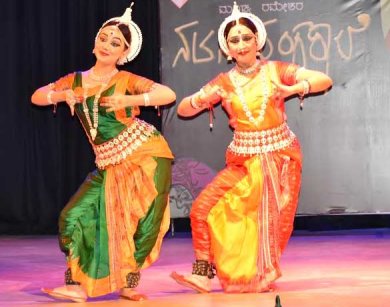 Vrinda Chadha and Ranjana Gauhar 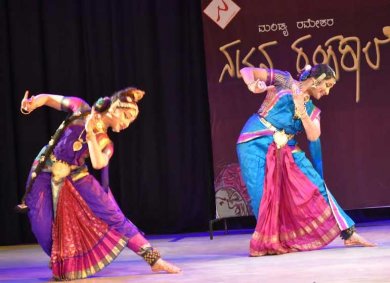 Prateeksha Kashi and Vyjayanthi Kashi Vyjayanthi Kashi, a multifaceted illustrious exponent of Kuchipudi hails from the family of legendary Dr. Gubbi Veeranna. She had organised this festival and gave a fine recital in Kuchipudi style with her daughter and disciple Prateeksha Kashi. A combination of good choreography and subtle nuances of this style came alive in their performance. Prateeksha captured the whole stage with her electrifying movements. A perfect harmony prevailed in their movements. They both are endowed with a natural flow which assumes new dimensions in every piece they dance. A lyric that explained the importance of angika, vachika and aharya in dance, choreographed by Vyjayanthi Kashi, was the opening piece, followed by the traditional Taranga of Narayana Theertha. Another solo by Vyjayanthi had the theme of Kanyakumari, in which lord Shiva is forced to break the promise to marry her. Vyjayanthi yet again transcended in her abhinaya. Kathak by Uma Dogra and her student Sarita Kalele was the final performance on the first day. A committed artiste that she is, Uma passed on her enthusiasm to one and all. Sarita proved to be a promising dancer. They brought out the many facets of Kathak in items marked by subtlety and neat presentations. An abhang and an ashtapadi were finely rendered by Uma with captivating abhinaya. A scintillating Tarana by Sarita brought the curtains down for the day. 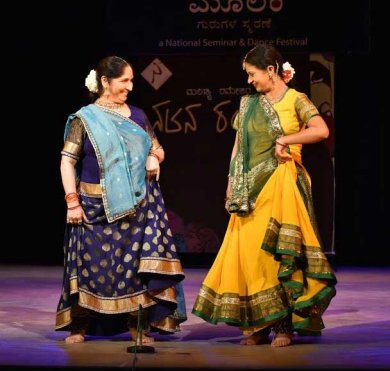 Uma Dogra and Sarita Kalele 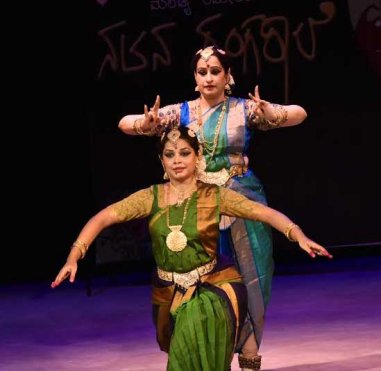 Dr. Anupama Kylash and Poojitha Krishnajyothi The opening of the second day was by Dr. Anupama Kylash who presented Vilasini Natyam. This style of dance was practiced by the Devadasis of Andhra. Anupama gave a detailed introduction of the dance form before performing. The different form in Arya Sampradaya like the temple tradition, the court tradition and ‘Aata Bhagavata’ which includes kalapam or solo pieces like Parijathaparinaya, were informative and interesting for the students present. The Vilasini style of dancing stands out for its distinct footwork, use of mudras and in the total presentation. Even the neck movement differed sometimes. Anupama, along with her disciple Poojitha Krishnajyothi started with ‘Bali harana,’ a ritual in temples where the eight dikpalakas are offered bali according to Vaishnava or Pancharatra agama. Every guardian of the eight directions has their own description with their particular vahana which was neatly presented by both of them. A rare opportunity indeed to witness this dance. Padam in Vilasini Nritya is a devotional dance offered to god in Ekaantha Seve or solitude. Devi Parvathi teasing her lord with hasya, shringara and adbhuta were beautifully portrayed by Anupama. ‘Kreedathi vanamali’ by Sadashiva Brahmendra had a rare insight in which the poet observes that the lord appears as Ugra Narasimha to the little lad Prahlada and as the dwarf Vamana for a demon like Bali. 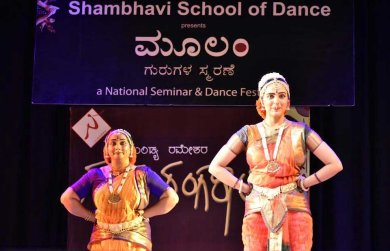 The final Bharatanatyam performance was by Kripa Phadke of Mysore. She was accompanied by Rajeshwari Pandit (vocal), Sanjana Gogate (nattuvanga), Dasappa (mridanga) and Rakesh (flute). Her talented disciple H.L. Nagashree had the opportunity of dancing with her guru. After the opening Pushpanjali by both of them, Nagashree continued with an appropriate devaranama “Guruvina gulamanaguva tanaka.” Her slender and flexible body moved easily with a back up of perfect footwork. They both shared the Padavarana and Kripa immersed in abhinaya in “Kadagolataarenna” as Sudhama in sanchari bhava. A crisp thillana in Mohana Kalyani brought the curtain down for this meaningful dance festival of ‘Remembering our Gurus.’ |